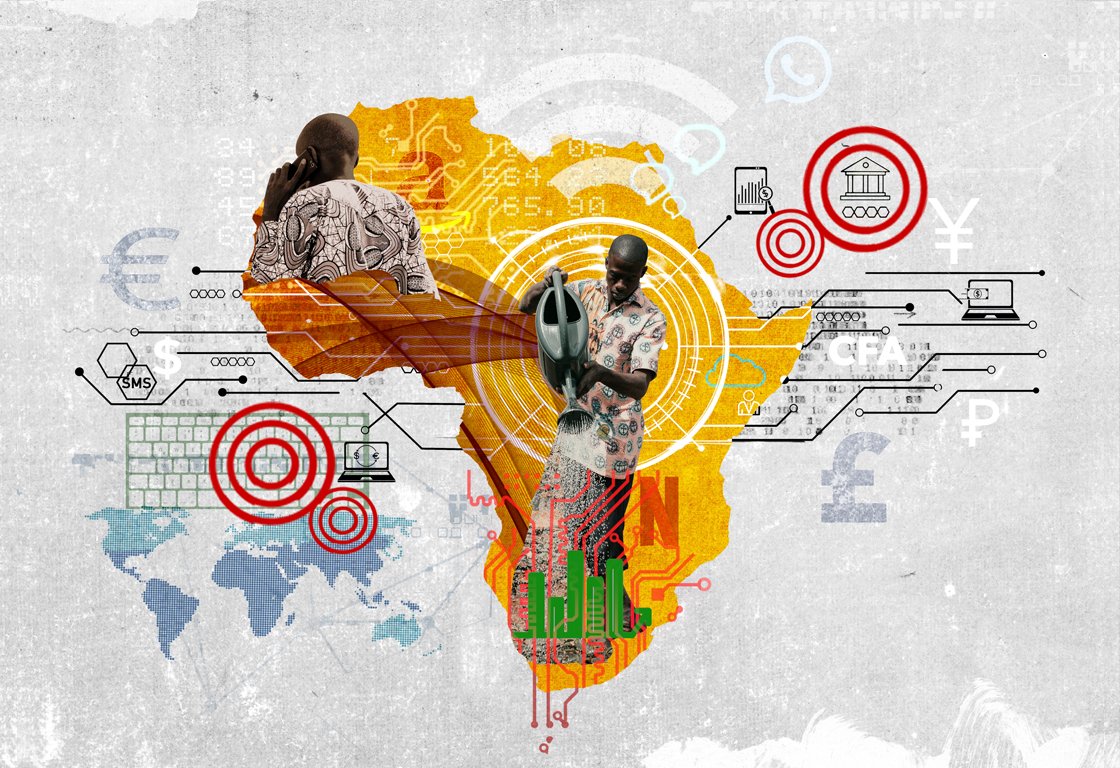Lost amid cryptocurrency’s recent crash has been another significant moment for financial tech (fintech) markets — an African digital payments company acquired a US firm to accelerate its growth strategy. The rare move is indicative of how African start-ups could soon become global giants within the fintech industry.
On June 6, MFS Africa, the continent’s largest facilitator of digital payments, whose network integrates more than 320 million mobile money accounts across at least 35 African countries, purchased Oklahoma-based Global Technology Partners (GTP) in a deal worth US$34 million. GTP is the biggest processor of prepaid cards in Africa, handling transactions from more than 80 of the continent’s leading banks, as well as Visa, Mastercard and other international financial institutions. MFS Africa reportedly acquired GTP mostly to enable more of Africa’s 1.4 billion people to access services on global platforms such as Amazon and Netflix, which generally don’t accept digital payments from large portions of the continent.
“This is a momentous milestone for us and Africa’s tech ecosystem — on many levels,” said Dare Okoudjou, the founder and CEO of MFS Africa, in a press release. “We are now truly an omnichannel payments company.”
Digital access to non-traditional banking and financial services has proven key to overcoming financial exclusion in emerging markets. The difficulties experienced by a small-scale farmer who cannot access crop insurance, an informal business that cannot obtain a loan, a parent who cannot save for their child’s education, or a household that cannot cover its bills on time are among the economic issues that African fintechs are working to solve. As a result, the region holds huge promise for companies, investors and entrepreneurs as it produces new tools to alleviate barriers that stifle economic growth and activity across the developing world.
Africa’s Growing Global Importance
Despite the global economy reeling for months from soaring inflation and the commodity and energy price shocks stemming from war in Ukraine, venture capital has continued to pour into Africa’s tech sector. From January to May this year, African start-ups received US$2.7 billion in funding — more than double the levels of the same period in 2021. The bulk of the money has come from US investors targeting firms in Egypt, Kenya, Nigeria and South Africa, tech hubs in, respectively, the north, east, west and south of the continent. Inflows to other African locations additionally grew by 382 percent year-on-year compared to 2021, a year in which African tech start-ups already raised a record US$5 billion — some 60 percent of that flowing toward fintechs.
Analysts suggest the pace of investment into the sector may slow if investor-originating countries like the United States dip into recession due to looming interest rate hikes meant to cool runaway inflation. However, the fundamental strengths and long-term viability of Africa’s fintech sector remain undeniable.
Africa’s vast geography and diverse populations are still often misrepresented and misunderstood on the global stage — an insidious legacy of the colonial gaze. A more nuanced and accurate portrayal of Africa’s dynamism would also reflect its potential for equitable exchange. Not simply passive consumers of foreign goods, services and culture, African stakeholders are instead innovators who have proven adept at creating solutions to seemingly intractable financial problems. Mobile money that doesn’t require an internet connection, customizable payment applications for businesses, innovative credit underwriting, vehicle financing for workers in the gig economy, real-time market access for small-scale farmers, and digitized stokvels (informal, invitation-only savings groups) are just a few.
In October 2021, Nigeria launched by far the world’s most ambitious digital currency to date, the eNaira, built on blockchain technology. Nigeria’s central bank has actively promoted the eNaira to increase financial inclusion, enable direct welfare payments to citizens, facilitate remittances from Nigeria’s sizable diaspora and improve the efficiency of cross-border payments. Moreover, as far back as 2016, South Africa established its own consortium of regulators, the Intergovernmental Fintech Working Group, with the mission of providing “a space for safe experimentation” to actively advance innovation. And before that, in 2011, the AfriLabs network was founded; it now consists of 347 innovation hubs across 52 African countries — each hub providing financial mentorship and, as described in a joint 2019 report by AfriLabs and Africa-focused data research company Briter Bridges, “a community and centre for learning that nurture innovative ideas and market disruption.”
The convergence of a new generation of digital-savvy youth, underserved middle classes, a thriving tech culture, rapidly growing urban centres and a landmark continental free trade agreement has created enormous new market opportunities with a potential for growth and scale that will be hard to match elsewhere in the foreseeable future. Indeed, if the adage that “demographics is destiny” holds truth, the twenty-first century may not belong to Asia so much as it might to Africa.
The continent is the world’s youngest and fastest growing region, with the average age of its population 19 years old and a total population set to nearly double to 2.5 billion by 2050. By that time, Africans will represent one in four people worldwide and possibly as much as 40 percent of the world’s youth. By that same point, rapid urbanization is expected to have produced 11 new African megacities (metropolitan areas with more than 10 million residents), beyond the three that already exist — Johannesburg, Kinshasa and Lagos.
January 2021 saw Africa launch the world’s largest free trade zone too, the Africa Continental Free Trade Area (AfCFTA). With its implementation, “the continent is creating an entirely new development path,” says the World Bank. Economic integration across Africa’s 54 nations has been a priority for years, and the AfCFTA is a major step beyond its existing regional economic agreements. Consulting firm McKinsey has projected that household consumption in the region will rise to US$2.1 trillion and business spending to US$3.5 trillion by 2025, underscoring the need for new capacities to support the seamless cross-border movement of finance.
Meanwhile, the latest Africa Wealth Report, released in April 2022, forecasts that technological advances and an emerging entrepreneurial class will serve as catalysts for a 38 percent jump in total private African wealth over the next 10 years. That could amount to at least US$800 billion in newly created value. A parallel expansion in connectivity is occurring as well. Some estimate that around three-quarters of Africans will have access to the internet by 2030, compared to 22 percent in 2020.
Yet with all of Africa’s anticipated economic growth and integration, several challenges persist, in particular, a resurgence in armed conflict, illicit financial flows, mounting environmental crises and the fact that half of the continent is unbanked. This last point, financial exclusion, affects most of the population in two of Africa’s leading tech hubs — Nigeria, which has more than 212 million people, 70 percent of whom have access to the internet, and Kenya, a nation of 55 million people, 83 percent of whom have internet access. Greater access to financial services is especially relevant for people whose livelihoods depend on activity in the informal economy, which contributes more than half of Sub-Saharan Africa’s combined GDP; these people comprise nearly two-thirds of the total Sub-Saharan labour force. Most informal workers struggle with costly inefficiencies and lack access to traditional banking options and social protections within the labour market. Other challenges to Africa’s economic growth include a current lack of multilateral policy harmonization to facilitate trade under AfCFTA, local currency fluctuations and limited foreign exchange liquidity.
However, African fintech companies are embracing these challenges as opportunities to provide innovative, homegrown digital finance solutions, many of which are scalable enough to become international solutions across emerging markets. Already 70 percent of the world’s US$1 trillion mobile money market by value is held in Africa. Meanwhile most of the continent’s unicorns (private companies valued over US$1 billion) are fintechs, and four of those — Flutterwave, OPay, Chipper Cash and Wave, Africa’s first francophone unicorn — became unicorns in 2021, proving the resilience of Africa’s fintech sector even under the unprecedented disruption of the COVID-19 pandemic.
The idea is to create a broader enabling environment to exchange ideas and information in a way that will have greater traction and lead to more fruitful connections.
The Time for Collaboration Is Now
Taken altogether, these dynamics mean that other actors in the fintech sector are arguably staring at a generational opportunity to forge innovative and meaningful connections with their African counterparts. This opportunity applies not only to investors, entrepreneurs and financial services companies, but also to policy specialists, consultancies, regulators and development officials. The Toronto office of Techstars — a network that offers holistic support to start-ups, with regional locations around the world — has demonstrated this by becoming a hub for equipping Africa-based start-up founders looking to accelerate their growth. This year, the Techstars Toronto Accelerator is working with a cohort of seven African companies, mostly fintech firms, many of which travelled to the city in late June for Collision Conference, North America’s fastest-growing tech gathering.
To create an enabling environment for such connections to occur as seamlessly as possible, some organizations have pursued an ecosystem-to-ecosystem approach instead. This method consists of connecting all the key stakeholders that play a critical and sometimes adjacent role to the fintech industry — the legal industry, regulators, economists, finance and investment professionals, academics and government, among others. The idea is to create a broader enabling environment to exchange ideas and information in a way that will have greater traction and lead to more fruitful connections.
One such attempt to bring groups together occurred during the inaugural Afrifursa Fintech Summit held virtually in September 2021. Attended by nearly 450 participants from 38 countries, the event focused specifically on alternative currencies, on using fintech to jump-start global growth, and on connecting the Canadian and African markets in a way that highlighted the vast potential for business-to-business opportunities and shared innovation between them. A second Afrifursa summit will take place in September 2022, with masterclasses being held in the weeks leading up to it.
Among the many insights offered by participants at the first Afrifursa Fintech Summit was how businesses looking to invest in Africa need to understand the policies and regulatory landscape on a country-by-country basis. Far from its frequent portrayal as a homogenous bloc, Africa is incredibly diverse — no one single approach will work for every country. For example, in Nigeria, mobile money is regulated by banks; in Kenya, it is overseen by the telcos. In addition, beyond just their language differences, francophone, anglophone and lusophone (Portuguese-speaking) markets in Africa differ in how their digital infrastructure has evolved, precisely because of their individual linguistic and post-colonial contexts.
Even for a well-established global financial services leader such as Canada, African countries can offer up lessons based on their unique experiences. This is particularly true around the creation of “regulatory sandboxes” — controlled, fintech-friendly environments with reduced regulation established to facilitate experimentation with new financial products and services. As investors also look to boost returns and achieve environmental, social and governance outcomes that are greater than those available within North America, Africa presents outsized opportunities as well. Canadian businesses recognizing the value in bringing greater equity, diversity and inclusion into their operations will find there are numerous stakeholders from the African diaspora in Canada who can provide value to those eager to engage the African continent and develop commercial solutions to global problems.
Overall, though, Africa-based specialists suggest Africa’s development story and narrative across the world still suffer the most from misinformation and lack of information. The tangible effect is that, with each passing year, the opportunity cost for not engaging with the African fintech market is likely much greater than is realized, even by experts.



